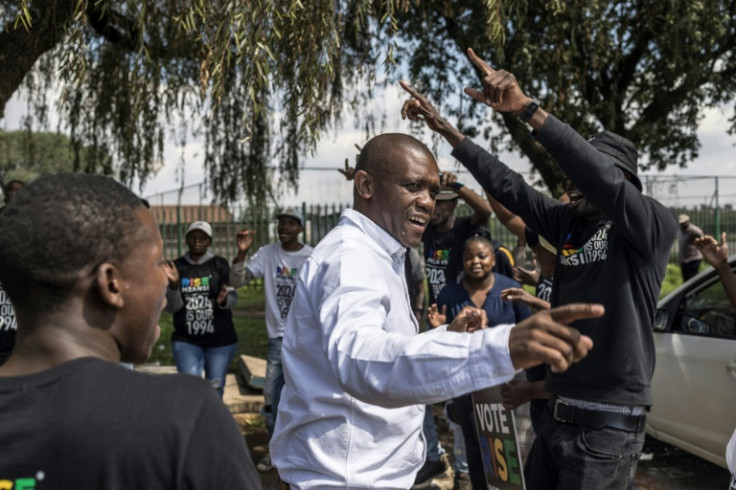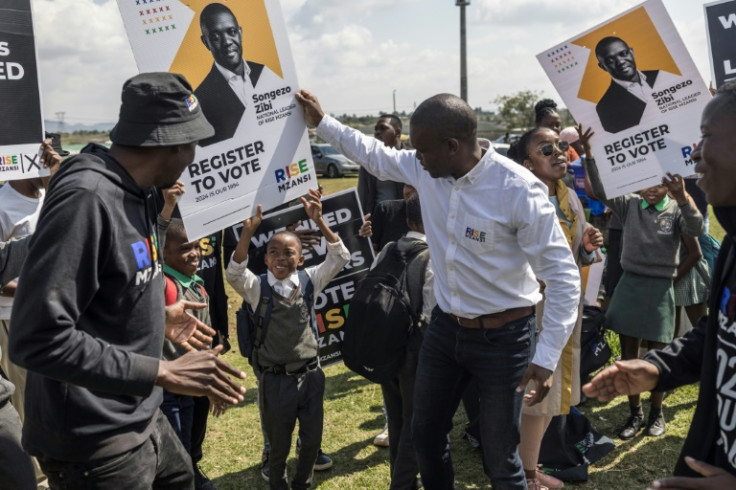
On a stretch of grass doubling as a parking lot in an impoverished Johannesburg township, a group of party activists chanted "we need new leaders!" timidly followed by a couple of dozen onlookers.
"Rise Songezo, Rise!" they continued before introducing Songezo Zibi, the head of Rise Mzansi -- a small party among a cohort of new groups competing in an increasingly fragmented opposition camp ahead of South Africa's general elections on May 29.
Unusually for a political leader, the former journalist then made his pitch promising nothing at all.
"I'm not going to lie and say to you... we are going to solve all your problems. It's not going to happen," Zibi told would-be-voters during a canvassing exercise in Eden Park, south of Johannesburg, on Friday.
The low-key strategy is a result of broad disillusionment with politics after three decades of African National Congress (ANC)-rule.
Thirty years after the former liberation movement won the first democratic elections, South Africa remains the world's most unequal nation, suffering from high unemployment, rampant crime, widespread corruption and a stagnant economy.
"People don't want to vote. They've given up on politics," Zibi, wearing a white shirt, trainers and jeans, told AFP on Friday.
At the last elections in 2019, only 49 percent of those of voting age showed up on election day.
"This is a big moment where it is possible to get a new leadership in South Africa, not just one leader, but a new cohort of leaders, who are going to refresh government and politics and do things differently," Zibi said.
"The problem is trust. People are not actually expecting a miracle. They want to know whether you told (them) the truth or not."
With down-to-earth policies including cracking down on corruption and reducing wasteful expenditures such as officials' outsize security details, the 48-year-old's approach has certainly convinced donors.
Founded only last year, Rise Mzansi raised almost 17 million rand ($900,000) between October and December last year -- more than any other party, according to electoral authorities.
Persuading voters has proven harder.
"I am not really yet convinced," said Lindiwe Dlamini, 27, unemployed.
From jobs to security, Eden Park, where schoolchildren play ball on streets lined with small, grey homes, dilapidated fences and some corrugated iron shacks, needs almost everything, but Zibi "did not offer us anything", she said.
Polls currently have the party at less than 1 percent nationwide with a peak of 4 percent in Johannesburg's Gauteng province, where posters sporting its Google-like blue, red, yellow and green logo are ubiquitous.
Political analyst Daniel Silke said that much like other smaller groups, Rise has struggled to differentiate itself from the pack, largely relying on Zibi's charismatic personality for recognition.
"The political policy points really are fairly pedestrian," he said.
Still, Zibi believes through relentless campaigning the party can reach five percent nationally.
Under South Africa's proportional system with no electoral threshold, that would translate into roughly 20 lawmakers in the 400-seat parliament.
It could be a sizeable prize.
Riddled by accusations of corruption and mismanagement, the ANC is expected to drop below 50 percent of the vote for the first time. Some polls put it as low as 37 percent.
This would force it to find coalition partners among the more than 50 parties in the running.
Almost all are polling at under two percent, with only the liberal Democratic Alliance (DA), the leftist Economic Freedom Fighters and the upstart uMkhonto we Sizwe fronted by former president Jacob Zuma reaching double digits.
Were it not to fall too short of 50 percent, analysts believe the ANC would prefer banding together with some of its smaller, less demanding rivals.
Named after a colloquial term for South Africa, Rise Mzansi, which Zibi describes as a "normal" European-style "social democratic" party halfway between "communism" and "rabid capitalism", has so far eschewed coalitions.
Negotiations to enter a DA-led grouping didn't bear fruit.
DA leader John Steenhuisen recently attacked it and others that refused to enter the pact as "mercenaries" bent on splitting the opposition vote to later cut a deal with the ANC.
Zibi, an eloquent man with a shaved head, took it as a sign that his party was seen as a threat. Budding up with the ANC could hurt Rise Mzansi's credibility as graft busters, he added.
"We are not obsessed about going into government at all," he said.








